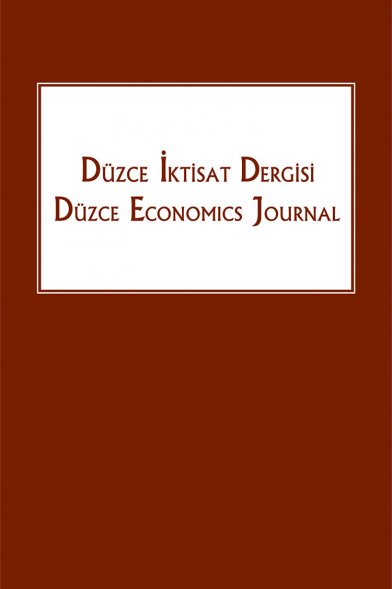Ekonomik Risklerin Doğrudan Yabancı Yatırımlar Üzerine Etkisi: Kırılgan Ekonomilerden Kanıtlar
Ekonomik Riskler, Doğrudan Yabancı Yatırımlar, Dinamik Panel Analizi.
The Effect of Economic Risks on Foreign Direct Investments: Evidence from Fragile Economies
___
Abbes, S. M., Belmokaddem M., Guellil M. S. & Ghouali Y. Z. (2015). Causal interactions between FDI, and economic growth: evidence from dynamic panel cointegration, Procedia Economics and Finance, 23, 276-90.
Anderson, T. W. & Hsiao, C. (1982). Formulation and estimation of dynamic models using panel data, Journal of Econometrics, 18(1), 47-82.
Arellano, M. & Bond, S. (1991). Some tests of specification for panel data: monte carlo evidence and an application to employment equations, Review of Economic Studies, 58, 277-297.
Arellano, M., & Bover, O. (1995). Another look at the instrumental variable estimation of error-components models. Journal of Econometrics, 68(1), 29-51.
Asiri, B. K. & Hubail, R. A. (2014). An empirical analysis of country risk ratings, Journal of Business Studies Quarterly, 5(4), 53-67.
Balan, F. (2019). The effect of political and financial risks on foreign direct investment to the MENAT Countries, Theoretical and Applied Economics, 36(2), 121-138.
Baltacı, N., Akyol, H., Kargı, B. & Beken, G. H. (2017). Ülke riskinin doğrudan yabancı yatırımlar üzerindeki etkisinin incelenmesi, III. IBANESS Congress Series, Edirne.
Baltagi, B. H. (2013). Econometric Analysis of Panel Data (5th edition). Chichester: John Wiley & Sons Ltd.
Batool, K. A. & Rehab, A. H. (2014). An empirical analysis of country risk ratings, Journal of Business Studies Quarterley, 5(4), 1-17.
Behr, A. (2003). A comparison of dynamic panel data estimators: monte carlo evidence and an application to the invesment function, Economic Research Centre of the Deutsche Bundesbank, Discussion Paper No:05/03.
Bekaert, G. & R. Hodrick. (2012). International Financial Management. 2nd Edition. New Jersey: Pearson.
Blundell, R., & Bond, S. (1998). Initial conditions and moment restrictions in dynamic panel data models. Journal of Econometrics, 87(1), 115-143.
Bouchoucha, N. & Benammou, S. (2018). Does institutional quality matter foreign direct investment? evidence from african countries, Journal of the Knowledge Economy, 11, 390-404.
Busse, M. & Hefeker, C. (2007). Political risk, institutions and foreign direct investment, European Journal of Political Economy, 23(2), 397-415.
Buttiglione, L., Lane, P., Reichlin, L., & Reinhart, V. (2014). Deleveraging, what deleveraging? The 16th Geneva Report on the world economy. Geneva: ICMB International Centre For Monetary and Banking Studies and London: CEPR Centre for Economic Policy Research. https://cepr.org/sites/default/files/news/Geneva16_0.pdf
Erkekoğlu, H. & Kılıçarslan, Z. (2016). Do political risks affect the foreign direct investment inflows to host countries?, Journal of Business, Economics and Finance –JBEF, 5(2), 218-232.
Gökmenoglu, K., Kırıkkaleli, D. & Eren, B. M. (2018). Time and frequency domain causality testing: the causal linkage between FDI and economic risk for the case of Turkey, Journal of International Trade and Economic Development, 0(0), 1–19.
Gujarati, D. N. (2004). Basic Econometrics. McGraw-Hill Companies. New York, NY, USA.
Hansen, L. P. (1982). Large sample properties of generalized method of moments estimators, Econometrica, 50(3), 1029–1054.
Hayakawa, K., Kimura, F. & Lee, H. H. (2013). How does country risk matter for foreign direct ınvestment?, The Developing Economies, 51(1), 60–78.
Kariuki, C. (2015). The determinants of foreign direct investment in the African Union. Journal of Economics, Business and Management, 3(3), 346-351.
Kaya Kanlı, N. & Aydoğuş, O. (2017). Ülke risk faktörlerinin doğrudan yabancı yatırımlar üzerindeki belirleyici etkisi, Ege Akademik Bakış, 17(2), 179-190.
Khan, M. M. & Akbar, M. (2013). The impact of political risk on foreign direct investment. Munich Personal RePEc Archive (MPRA) Paper, Paper No. 47283, 2013, 1-16.
Krifa-Schneider, H. & Matei, I. (2010). Business climate, political risk and FDI in developing countries: evidence from panel data, International Journal of Economics and Finance, 2(5), 54-65.
Kurtaran, A. (2007). Doğrudan Yabanci Yatirim Kararlari ve Belirleyicileri. Atatürk Üniversitesi Sosyal Bilimler Enstitüsü Dergisi, 10(2), 367-382.
Meyer, D. F. & Habanabakize, T. (2018). An analysis of the relationship between foreign direct investment (FDI), political risk and economic growth in South Africa, Business and Economic Horizons, 14(4), 777-788.
Nelson, M. M., Sooreea, R. & Gokcek, G. (2016). The FDI-political risk nexus: some new insights, The Business & Management Review, 7(5), 33-42.
Nickell, S. (1981). Biases in dynamic models with fixed effects, Econometrica, 49(6), 1417-1426.
Özşahin, C. & Özşahin, Ş. (2020). The nexus between political risks and foreign direct investment: an empirical analysis for north african countries, MANAS Sosyal Araştırmalar Dergisi, 9, 2430-2446.
Roodman, D. (2009). How to do xtabond2: An introduction to difference and system GMM in Stata. The stata journal, 9(1), 86-136.
Savrul, M. & Azazi, H. (2019). The effects of political risk and economic policy uncertainty on foreign direct investments: a panel cointegration analysis for selected eu countries, Girişimcilik ve Kalkınma Dergisi, 14(1), 87-100.
Sedik, W. M. (2012). The impact of country risk and new institutional economics on foreign direct investment: a panel data analysis for middle east and north africa region. The 16th Meeting of the International Society for New Institutional Economics, University of Southern California, USA.
Tatoğlu, F. (2012). Panel Veri Ekonometrisi: Stata Uygulamalı. Beta Yayıncılık, İstanbul.
Topal, M. & Gül, Ö. (2016). The effect of country risk on foreign direct investment: a dynamic panel data analysis for developing countries, Journal of Economics Library, 3(1), 141-155.
Topaloğlu, E. & Korkmaz, T. (2021). Politik riskin doğrudan yabancı yatırımlar ve pay piyasası endeks getirilerine etkisi: G7 ülkeleri üzerine bir uygulama, Verimlilik Dergisi, (1), 97-115.
Türedi, S. (2018). The effect of corruption and country risk on FDI inflows: empirical evidence from developing countries, Uluslararası İktisadi ve İdari İncelemeler Dergisi, (21), 151-172.
- ISSN: 2757-6558
- Yayın Aralığı: Yılda 2 Sayı
- Başlangıç: 2020
- Yayıncı: Şerif CANBAY
Türkiye’de Kamu Harcamaları ile İşsizlik Arasındaki İlişkinin Ampirik Analizi
Oğuz GÜLCAN, İsmail Sadık YAVUZ
Mehmet POLAT , Ahmet AKYILDIRIM
Ekonomik Risklerin Doğrudan Yabancı Yatırımlar Üzerine Etkisi: Kırılgan Ekonomilerden Kanıtlar
Örgütler Açısından İntikam ve Sabotaj Kavramlarının Karşılaştırılması
Mehmet SAĞIR, Ayşe Nihan ARIBAŞ
Frequency Domain Causality Analysis of the Energy- Economic Growth Relationship for Turkey
